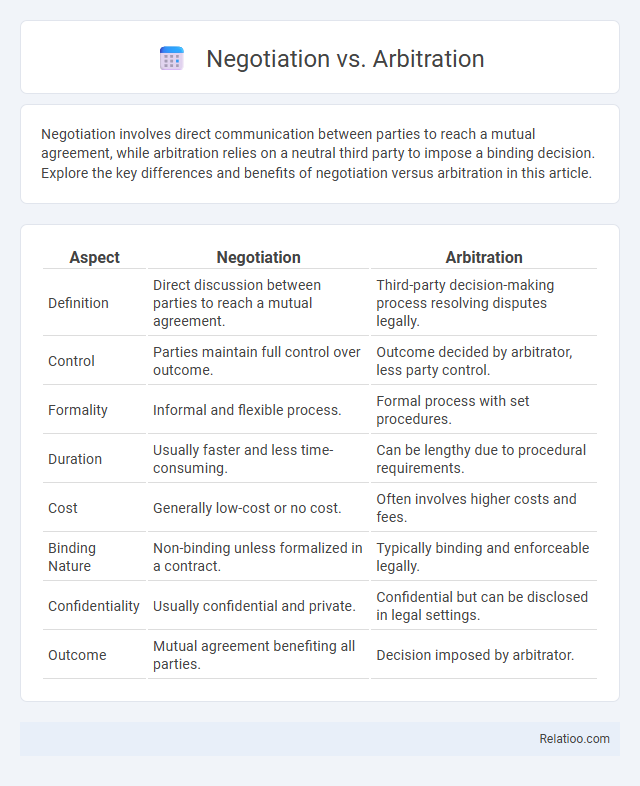Negotiation involves direct communication between parties to reach a mutual agreement, while arbitration relies on a neutral third party to impose a binding decision. Explore the key differences and benefits of negotiation versus arbitration in this article.
Table of Comparison
| Aspect | Negotiation | Arbitration |
|---|---|---|
| Definition | Direct discussion between parties to reach a mutual agreement. | Third-party decision-making process resolving disputes legally. |
| Control | Parties maintain full control over outcome. | Outcome decided by arbitrator, less party control. |
| Formality | Informal and flexible process. | Formal process with set procedures. |
| Duration | Usually faster and less time-consuming. | Can be lengthy due to procedural requirements. |
| Cost | Generally low-cost or no cost. | Often involves higher costs and fees. |
| Binding Nature | Non-binding unless formalized in a contract. | Typically binding and enforceable legally. |
| Confidentiality | Usually confidential and private. | Confidential but can be disclosed in legal settings. |
| Outcome | Mutual agreement benefiting all parties. | Decision imposed by arbitrator. |
Introduction to Negotiation and Arbitration
Negotiation involves direct communication between parties to reach a mutually acceptable agreement without outside intervention, emphasizing collaboration and problem-solving. Arbitration, by contrast, refers to a formal dispute resolution process where an impartial arbitrator reviews the case and imposes a binding decision, often resembling a private court trial. Understanding the key differences between negotiation and arbitration helps you choose the most effective approach for resolving conflicts based on control, cost, and desired outcome.
Key Definitions: Negotiation vs Arbitration
Negotiation is a collaborative process where parties voluntarily discuss terms to reach a mutual agreement without involving third parties. Arbitration involves a neutral third-party arbitrator who reviews evidence and makes a binding decision to resolve disputes outside of court. Unlike negotiation, arbitration provides a structured, formal resolution with limited opportunities for appeal.
Core Principles of Negotiation
Core principles of negotiation center on mutual benefit, open communication, and voluntary agreement, setting it apart from arbitration and mediation. You engage directly with the other party to collaboratively resolve disputes, ensuring your interests are addressed through compromise and problem-solving. Unlike arbitration, where a neutral third party imposes a binding decision, negotiation empowers you to control the outcome and maintain relationships.
Fundamental Aspects of Arbitration
Arbitration is a form of alternative dispute resolution where a neutral third party, the arbitrator, makes a binding decision after evaluating evidence and arguments from both sides, providing a more formal and structured process than negotiation. Unlike negotiation, which relies solely on the parties' willingness to compromise, arbitration ensures enforceability and finality of the decision without court intervention. Key fundamental aspects of arbitration include neutrality, confidentiality, procedural flexibility, and the ability to resolve disputes efficiently with legally binding outcomes.
Process Differences: Negotiation vs Arbitration
Negotiation is an informal, flexible process where parties communicate directly to reach a mutually acceptable agreement without third-party involvement. Arbitration involves a formal procedure where a neutral arbitrator listens to both sides, examines evidence, and delivers a binding decision. The primary process difference lies in negotiation's collaborative, voluntary nature versus arbitration's structured, adjudicative approach with a decision imposed by the arbitrator.
Advantages of Negotiation
Negotiation offers distinct advantages such as flexibility, cost-effectiveness, and the preservation of relationships by enabling direct communication between parties without third-party intervention. Unlike arbitration or litigation, it allows for tailored solutions that meet the specific needs and interests of both sides, fostering collaborative problem-solving. The informal nature of negotiation accelerates resolution time and maintains confidentiality, making it ideal for disputes where ongoing cooperation is crucial.
Benefits of Arbitration
Arbitration offers a legally binding resolution enforced by a neutral third party, ensuring faster dispute settlement compared to traditional court litigation. It provides confidentiality, which protects the involved parties' business reputations and sensitive information. The process is often more cost-effective and flexible than formal trials, allowing customized procedures tailored to the specific needs of international commercial disputes.
Drawbacks and Limitations of Each Method
Negotiation can suffer from power imbalances and lack of formal enforcement, leading to unresolved disputes or unfair outcomes. Arbitration often incurs high costs and limited appeal options, restricting parties' ability to challenge decisions even if errors occur. Mediation may fail when parties are unwilling to cooperate, and the non-binding nature of agreements can result in prolonged conflicts.
Choosing the Right Dispute Resolution Approach
Choosing the right dispute resolution approach depends on factors such as cost, time, confidentiality, and control over outcomes. Negotiation offers flexibility and direct communication between parties, ideal for preserving relationships and reaching mutually acceptable solutions. Arbitration provides a legally binding resolution with a faster timeline than litigation, suitable for those seeking an expert's decision without court involvement.
Conclusion: Which Is More Effective?
Arbitration offers a binding resolution enforced by legal authority, making it more effective for disputes requiring finality and structure. Negotiation provides flexibility and fosters collaborative solutions, often preserving relationships but lacking enforceability. Mediation balances facilitation with neutrality, promoting mutual agreement without imposing decisions, which can be less decisive than arbitration but more constructive than negotiation alone.

Infographic: Negotiation vs Arbitration
 relatioo.com
relatioo.com